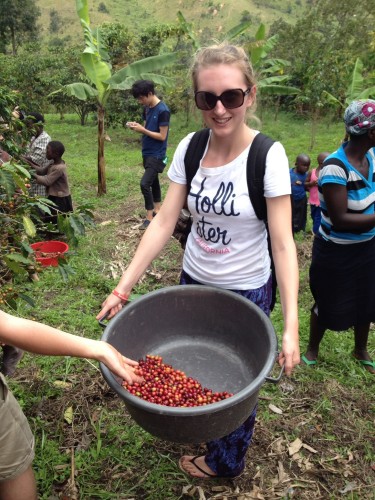Charlotte Whitmarsh is a third-year BSc (Hons) Geography student at UWE, who travelled to Uganda in the summer of 2014 as part of the UWE Global Water Security Project.
 I had never thought about carrying out the research for my dissertation abroad until Volunteer Uganda‘s Rebekah Yore came and gave a talk at UWE during my second year. The opportunity to spend a month in Uganda with the added bonus of collecting all my data sounded fantastic.
I had never thought about carrying out the research for my dissertation abroad until Volunteer Uganda‘s Rebekah Yore came and gave a talk at UWE during my second year. The opportunity to spend a month in Uganda with the added bonus of collecting all my data sounded fantastic.
As I got on the plane to Uganda, I wondered what I had got myself into. I had never travelled alone, nor visited Africa. However, what followed was a humbling yet incredible experience and one that I will never forget!
I was part of Volunteer Uganda’s research team, comprising of 14 students and 4 leaders. The research conducted was a long term baseline study on agriculture in the Kanungu district; this topic was bought up in the 2013 Multidimensional Poverty Index study as a major issue to development. We conducted 195 household interviews in 6 sub-counties and 10 focus groups, 2 in each sub-county bar one.
Discovering the main barriers and issues which arise in agriculture, such as seasonal variation, infrastructure and lack of capital, will now allow Volunteer Uganda to work with organisations to find solutions and create development plans to help overcome the barriers, aid development and in turn improve livelihoods. For example, implementing irrigation systems in the area would improve quality of produce and allow farmers to farm throughout the year and not just in the wet season and would therefore increase income, creating a multiplier effect.
My dissertation, which looks at the links between seasonality, climate change and water as a barrier to agriculture evolved so much in Uganda. I got the chance to have an input into the questionnaire and focus group questions as part of my data collection. Collecting data first hand as well as being part of the Ugandan experience has provided me with invaluable quantities of knowledge for my dissertation. I also gained significant research skills from learning how to record data on QuestionPro, an app on the Google Nexus Tablets we used to collect data, to coding qualitative and quantitative data from focus groups.
At the end of our time in Uganda we presented our findings to Great Lakes Regional College – the students from this college acted as our translators when out conducting research. The lecturers were really interested in our data and thankful for all our work in their community.
Spending the month in Uganda and experiencing the culture was a real eye opener. The people were so generous and welcoming, offering us food when they had nothing. Their children would shout ‘Mzungu’ at us through the excitement of seeing a ‘white person’. Actively being involved in this research and meeting communities has given me more of an insight than any book ever could.
I am now more motivated to write up my dissertation, especially as I have so much experience in the field of my research. I also now know my future career direction: food security!
If I could do it all again, the only thing I would change would be the length of time I spent out in Uganda – I would have gone for longer!

